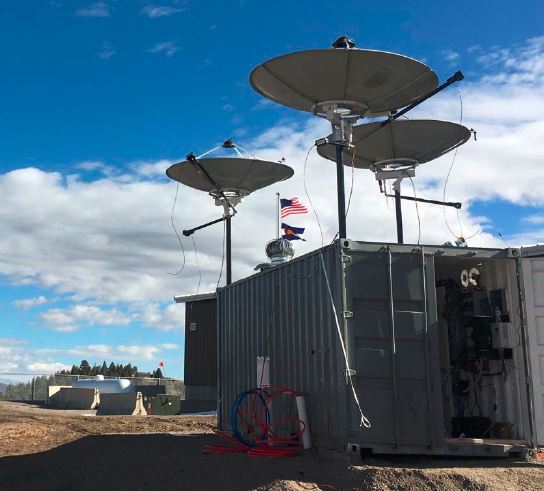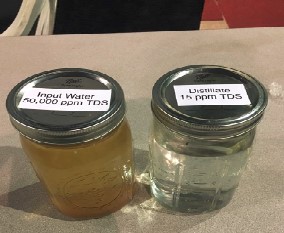An innovative distillation treatment system is helping the Colorado Department of Transportation (CDOT) treat greywater from the floor drains of its maintenance facilities. This new system not only is showing environmental benefits, but also is helping to cut costs.

Distillation technology. Photo: Colorado DOT
Background on the System
The technology is a portable water purification system powered by a hybrid solar/natural gas system to distill the dirty water, separating out the salts and other contaminants from the purified water. The treated water then can be reused to wash trucks or for other purposes in the maintenance facilities, and the recovered salts can be reused in deicing operations.
During winter months, CDOT snowplows generate large volumes of ice melt and wash water, with nowhere to send it, explained Theresa Santangelo-Dreiling, CDOT’s Hazardous Waste Management Supervisor. To meet federal requirements, CDOT needed to treat up to 1 million gallons of greywater from floor drains of 50 maintenance facilities. While other technologies were able to separate oil, chlorinate water, and filter suspended solids, the distillation technology helped CDOT address the facilities’ biggest challenge: removing the salts.
The distillation system, which was recommended by a consultant, originally was used as a desalination solution for poor communities that lacked clean water. In recent years, it has been used successfully to treat waste water produced from natural gas extraction processes.
CDOT decided to conduct a pilot test to determine whether the technology could provide a cost-effective solution to treat floor drain water at several of its maintenance facilities. If successful, the method could be implemented at maintenance yards statewide and could offer a solution to treat stormwater, for construction dewatering, or for other DOT applications.
The technology was tested at several facilities in the state, including Fairplay and Blue Mesa, with impressive results. The vast majority of parameters tested – including total dissolved solids, total suspended solids, chloride, various metals, bacteria, and even uranium – achieved near 100 percent reduction from the influent to the distillate.

Water samples before and after the distillation process. Photo: Colorado DOT
The pilot test found that the units were robust and dependable. Not only was the treated greywater suitable for washbay operations, it met regulatory standards for surface discharge. In addition, the characteristics of the concentrate brine suggested it would be suitable for re-use in deicing operations.
Santangelo-Dreiling said the solution also was cost effective. Prior water treatment equipment costs for the maintenance facilities ranged from $200,000 to $300,000, compared to about $75,000 for the distillation treatment units.
Lessons Learned and Next Steps
CDOT has used the technology at four facilities, and it is working on implementing a statewide program at 46 additional locations. For the statewide program, CDOT would not own the units, but would implement the program as a flat-rate “utility” based model. The agency would rent the units and the consultant would be responsible for operations and maintenance. A monthly bill would be generated based on the quantity of water treated.
Based on the characteristics of each location, the technology may be implemented either with fixed units or mobile units. Operators monitor the units off-site, via remote telemetry. The agency also will continue to consider this technology for other applications, such as stormwater treatment and dewatering.
Although it is still in the early stages, Santangelo-Dreiling said the technology has proven to be highly effective and she would recommend it to other state DOTs. CDOT is continuing to evaluate the system, she noted. For example, staff are looking into whether the correct amount of solar energy is being used, rather than relying on the natural gas backup system.
The pilots have shown the solution to be cost effective and environmentally sound, and it frees up maintenance staff from handling wastewater treatment.
“It answered our prayers,” she said.
For more information, contact Theresa Santangelo-Dreiling, CDOT, at [email protected].

